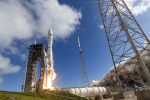中新網評:頻頻渲染中國“太空威脅” 美式霸權思維瀰漫外太空
中新網北京1月6日電(蔣鯉)近日,美國國家航空航天局(NASA)局長比爾•尼爾森宣稱,中美“正處於一場太空競賽”,還警告美國不要讓中國“打着科學研究的幌子”抵達月球上的某個地方。
2022年12月13日,美國航空航天局局長比爾·尼爾森在華盛頓舉行的美非領導人峰會太空論壇上發表講話。
這已經不是尼爾森第一次炒作“中國太空威脅論”了。在去年7月,這位NASA局長接受採訪時公然聲稱小心“中國佔領月球”;在美國衆議院撥款委員會聽證會上,要錢心切的尼爾森更是信口開河,聲稱中國很擅長“偷竊”美國的航天技術。
一直以來,中國航天事業的發展都遵循着獨立自主、自力更生的道路,同時深化高水平國際交流與合作。中國官方已對外宣佈,首批國際合作項目載荷將於2023年進入中國空間站,也在積極進行培訓國外航天員的相關準備工作。
然而,中國秉承的開放共享發展理念被美國某些政客官員頻頻“抹黑”,究其深層原因,一是中國在航空領域的發展讓美國感到壓力——根據美國政治新聞網的報道,美國的阿爾忒彌斯計劃依靠一系列仍在開發中的新系統和設備,如果出現任何重大延期或紕漏,都有可能使美國在登月方面落後於中國。而NASA的登月時間表從特朗普政府時開始已經推遲了一年。
爲此,美國在國際航天合作上設置障礙,恣意制裁別國航天機構,出臺法案限制與中國開展航天合作與交流,其雙標做法不言而喻。
二是,美國根深蒂固的霸權思維和“尚爭”文化作祟,不僅在經濟、科技等領域打壓中國,太空也被當成遏制中國的角鬥場。
一旦把對方界定爲競爭對手,與之“共存”的意願和空間就會急劇壓縮。爲在航天領域稱霸,美國早在2014年就啓動所謂的“地球同步軌道空間態勢感知計劃”,對他國衛星進行監視竊聽。
美國政府還公然將太空界定爲“作戰疆域”,組建太空軍和太空司令部,大力研發部署進攻性武器,甚至和商業公司合作,來滿足其國防和情報機構日益增長的需求。
挑動太空軍備競賽,加劇太空軍事化風險,美國給太空和平與安全造成了重大挑戰。作爲負責任大國,美國應早日摒棄冷戰思維,正確看待他國航天成就,積極探索太空國際合作,讓太空造福人類,而非成爲滿足其稱霸野心的擂臺。
Hegemonic U.S. thinking pervades to space
(ECNS) -- NASA Administrator Bill Nelson recently declared that China and the U.S. were in a “space race” and warned that the U.S. better watch out that China doesn’t "get to a place on the moon under the guise of scientific research."
Nelson has peddled the "China threat" in space more than once. Last July, he blatantly claimed that China is trying to “occupy the moon,” and during a House Appropriations Committee hearing, the senior official said he wanted more money for NASA and alleged that China is "good at stealing" American technology.
China has long been taking the path of independence and self-reliance in its space development, while deepening high-level international exchanges and cooperation. It has made an announcement that the first batch of payloads of projects under international cooperation would be delivered to China's space station for experiments by 2023. Meanwhile, the country has been actively preparing for training foreign astronauts.
Frequent smearing by some U.S. politicians and officials of China's open and shared development in space may attribute to the following two issues.
On the one hand, the U.S. has felt the pressure as China's space technology has developed fast over the past years.
According to the U.S. media outlet Politico, the country’s Artemis I mission, which is counting on a series of new systems and equipment that are still under development, could risk falling behind China if there is any significant delays or mishaps. Besides, NASA’s moon-landing timeline has already slipped a year from the Trump administration.
As such, the U.S. has laid barriers on international space cooperation and imposed sanctions on other space agencies. It introduced bills to restrict space cooperation and exchanges with China, revealing its double standards.
On the other hand, deep-rooted hegemonic thinking of the U.S. and contention culture make it resolute in suppressing China in the fields of economy, science and technology, and even in space.
In order to maintain its hegemony in space, the U.S. launched a Geosynchronous Space Situational Awareness Program in 2014 to surveil other countries’ satellites. It also recognized space as a "domain of war," establishing a space command center and space force, and developing and deploying offensive space weapons.
In addition, it has cooperated with private companies in order to meet the increasing demand of its national defense departments and intelligent agencies.
The U.S. is inciting the arms race in space, aggravating the risk of militarization of space and posing a major challenge to peace and security. It should abandon this Cold War mentality, actively participate in international space cooperation, and allow space to benefit humankind instead of making it a platform to satisfy its hegemonic ambition.
來源:中國新聞網












